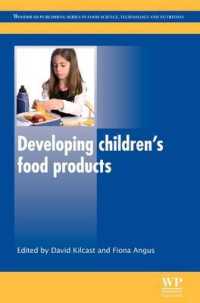Full Description
This volume presents work focused on underrepresented persons in a variety of levels of higher education. Each scholar has used critical quantitative approaches to examine access and/or success in the higher education arena. Their scholarship pushes the boundaries of what we know by questioning mainstream notions of higher education through: * the examination of policies * the re-framing of theories and measures * the reexamination of traditional questions for nontraditional populations. The work is divergent, but the commonality of the presentations lies in each scholar s critical approach to conventional quantitative scholarship. Their research highlights inequities and explores factors not typically included in conventional quantitative analysis. This is the 158th volume of this Jossey-Bass quarterly report series. Always timely and comprehensive, New Directions for Institutional Research provides planners and administrators in all types of academic institutions with guidelines in such areas as resource coordination, information analysis, program evaluation, and institutional management.
Contents
1. Critical Quantitative Inquiry in Context 1 Frances K. Stage, Ryan S. Wells This chapter briefly traces the development of the concept of critical quantitative inquiry, provides an expanded conceptualization of the tasks of critical quantitative inquiry, offers theoretical explanation and justification for critical research using quantitative methods, and previews the work of quantitative criticalists presented in this volume 2. Strains, Strengths, and Intervention Outcomes: A Critical Examination of Intervention Efficacy for Underrepresented Groups 9 Krystal L. Williams This chapter discusses a critical quantitative approach for improving STEM pipeline interventions. It discusses racial/ethnic and gender disparities in STEM, highlights the role of policy interventions in decreasing gaps, and presents a strength-based framework for investigating intervention efficacy. 3. Civic Engagement Measures for Latina/o College Students 23 Cynthia M. Alcantar This chapter employs a critical quantitative approach to examine models and measures of civic engagement for Latina/o college students. Alternative measures of civic engagement are presented based on factors that impact civic engagement for Latina/os. 4. Using Large Data Sets to Study College Education Trajectories 37 Leticia Oseguera, Jihee Hwang The authors present a quantitative study on low-income students using a national data set and describe how a critical quantitative scholar may consider analytic alternatives and make decisions during the research process. 5. Critical Quantitative Study of Immigrant Students 51 Katherine M. Conway This chapter discusses the importance of critical quantitative research for studies of immigrant students, a large and growing group, whose higher education experience is crucial to the future of the United States. Important distinctions among immigrant students and areas of future inquiry are presented. 6. Minority-Serving Institutions and the Education of U.S. Underrepresented Students 65 Ginelle John, Frances K. Stage This chapter examines the institutional contexts within which underrepresented students study. Using national data, the chapter examines numbers of bachelor s degrees awarded to students by three types of institutions: minority-serving institutions, predominantly minority institutions, and predominantly White institutions. 7. Disrupting the Pipeline: Critical Analyses of Student Pathways Through Postsecondary STEM Education 77 Heather E. Metcalf This chapter critically examines the pipeline model ideology that has become embedded within academic discourse, research, and data surrounding STEM work and education. The chapter provides novel alternatives for quantitative analysis and applies this approach to analysis of the STEM workforce. 8. The Changing Context of Critical Quantitative Inquiry 95 Cecilia Rios-Aguilar The author reflects on each chapter in this volume and presents an extended framework to help scholars in the field of higher education and institutional research to be critical. She concludes by describing the opportunities and challenges of this recommended approach. INDEX 109








